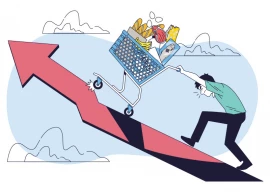
The Greek people have now raised their voice to put the proposals of these two institutions before the public to obtain national approval through a referendum. They felt that the policies of these two institutions are meant to serve the interests of certain nations and of the giant corporate lobby. Why cant we do the same in Pakistan?
So far the Pakistani public has suffered in silence. Pakistan is a victim of faulted IMF policies. The government remains oblivious. It has even has turned a deaf ear to the statement of the new IMF chief who admitted that the institution needs to change its policies which are meant to protect US interests and shore up the US dollar.
The Greek apprehension and IMF Chief’s statement is apparent from the policies suggested for Pakistan.
For instance, initially a tight monetary policy was suggested for Pakistan, contrary to the Fiscal Stimulus Plan suggested for OECD countries. The Fiscal Stimulus Plan was nothing but a concept of Islamic economics based on distribution of wealth instead of accumulation, as is evident from a tight monetary policy.
These two institutions have always sought increase in electricity prices on the premise of subsidy reduction but have never objected to the indirect taxes collected along with the bills. It is evident that the current inflationary pressure is basically the core outcome of such a policy as electricity is a major cost of production.
On the front of revenue collection, they dictated about imposition of VAT which was even turned down by the US during this recessionary period. But the pressure of imposition is still on Pakistan and US administration stated that at this juncture of economic recession, we cannot overburden the general public.
On another front, these two institutions have always spoken about revenue generation and never questioned the utilization and corruption. Further, during TARP, they always had been on the forefront for giving contracts to non residents instead of local companies who are well versed with environment and legislation.
All the above cited and many other reasons, raise serious doubts about the policies of these two institutions. Moreover, it is also felt that our local institutions like the State Bank of Pakistan and Federal Board of Revenue do not appear to have adequate human resources and know how to deal with the onslaught of the lending bodies. Everyone in these two institutions is reporting to them instead of following local organizational hierarchy. This must come to an end and adequate expertise for strategic experience may be shared but not on tactical or operational level when World Bank is dictating about imposition of automatic penalty irrespective of the fact that taxpayer is traceable or not!
Published in the Express Tribune, June 7th, 2010.



-(1)1717678110-0/Kendrick-(1)-(1)1717678110-0-165x106.webp)



1732865927-0/Untitled-design-(74)1732865927-0-270x192.webp)









COMMENTS
Comments are moderated and generally will be posted if they are on-topic and not abusive.
For more information, please see our Comments FAQ